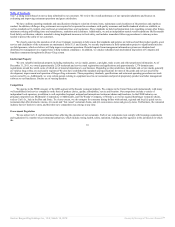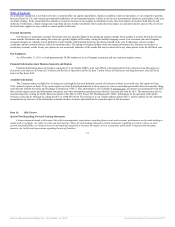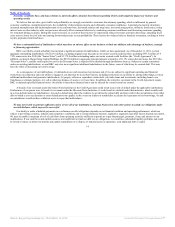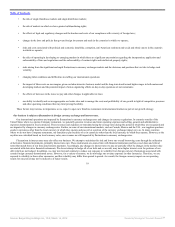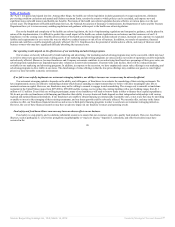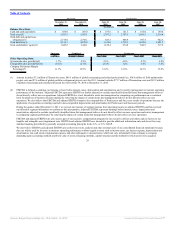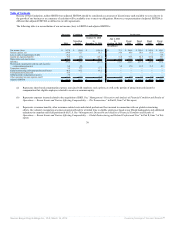Burger King 2011 Annual Report Download - page 21
Download and view the complete annual report
Please find page 21 of the 2011 Burger King annual report below. You can navigate through the pages in the report by either clicking on the pages listed below, or by using the keyword search tool below to find specific information within the annual report.
Table of Contents
the “Acts”) was passed and signed into law. Among other things, the health care reform legislation includes guaranteed coverage requirements, eliminates
pre-existing condition exclusions and annual and lifetime maximum limits, restricts the extent to which policies can be rescinded, and imposes new and
significant taxes on health insurers and health care benefits. Provisions of the health care reform legislation become effective at various dates over the next
several years. The Department of Health and Human Services, the National Association of Insurance Commissioners, the Department of Labor and the Treasury
Department have yet to issue necessary enabling regulations and guidance with respect to the health care reform legislation.
Due to the breadth and complexity of the health care reform legislation, the lack of implementing regulations and interpretive guidance, and the phased-in
nature of the implementation, it is difficult to predict the overall impact of the health care reform legislation on our business and the businesses of our U.S.
franchisees over the coming years. Possible adverse effects of the health care reform legislation include reduced revenues, increased costs, exposure to expanded
liability and requirements for us to revise the ways in which we conduct business or risk of loss of business. In addition, our results of operations, financial
position and cash flows could be materially adversely affected. Our U.S. franchisees face the potential of similar adverse effects, and many of them are small
business owners who may have significant difficulty absorbing the increased costs.
Our operating results depend on the effectiveness of our marketing and advertising programs.
Our revenues are heavily influenced by brand marketing and advertising. Our marketing and advertising programs may not be successful, which may lead
us to fail to attract new guests and retain existing guests. If our marketing and advertising programs are unsuccessful, our results of operations could be materially
and adversely affected. Moreover, because franchisees and Company restaurants contribute to our advertising fund based on a percentage of their gross sales, our
advertising fund expenditures are dependent upon sales volumes at system-wide restaurants. If system-wide sales decline, there will be a reduced amount
available for our marketing and advertising programs. In addition, in response to the recession, we have emphasized certain value offerings in our marketing and
advertising programs to drive traffic at our stores. The disadvantage of value offerings is that the low-price offerings may condition our guests to resist higher
prices in a more favorable economic environment.
If we fail to successfully implement our restaurant reimaging initiative, our ability to increase our revenues may be adversely affected.
Our restaurant reimaging initiative depends on the ability, and willingness, of franchisees to accelerate the remodeling of their existing restaurants. We
have implemented a more cost effective remodeling solution which focuses spending on improvements that we believe will drive meaningful sales lifts to
maximize return on capital. However, our franchisees may not be willing to commit to engage in such remodeling. The average cost to remodel a stand-alone
restaurant in the United States ranges from $275,000 to $550,000 and the average cost to replace the existing building with a new building ranges from $1.1
million to $1.5 million. Even if they are willing to participate, many of our franchisees will need to borrow funds in order to finance these capital expenditures.
We do not provide our franchisees with financing and therefore their ability to access borrowed funds depends on their independent relationships with various
regional and national financial institutions. If our franchisees are unable to obtain financing at commercially reasonable rates, or not at all, they may be unwilling
or unable to invest in the reimaging of their existing restaurants, and our future growth could be adversely affected. We currently offer, and may in the future
continue to offer, our franchisees financial incentives and access to third-party financing programs in order to accelerate our restaurant reimaging initiatives.
However, the cost of these financial incentives may have an adverse impact on our franchise revenues and operating results.
Food safety and food-borne illness concerns may have an adverse effect on our business.
Food safety is a top priority, and we dedicate substantial resources to ensure that our customers enjoy safe, quality food products. However, food-borne
illnesses, such as pathogenic E. coli, bovine spongiform encephalopathy or “mad cow disease,” hepatitis A, salmonella, and other food safety issues have
occurred in the
20
Source: Burger King Holdings Inc, 10-K, March 14, 2012 Powered by Morningstar® Document Research℠


